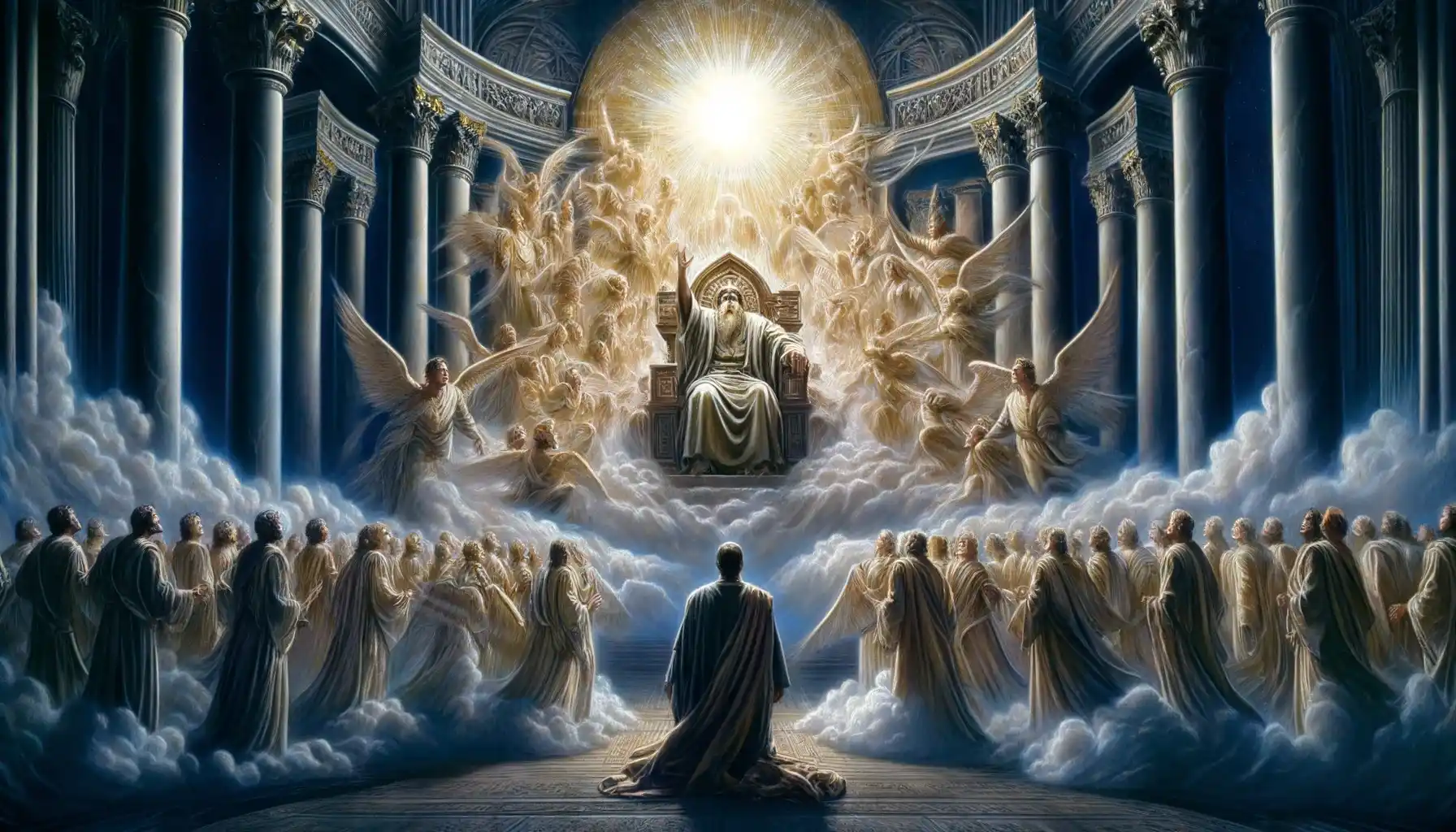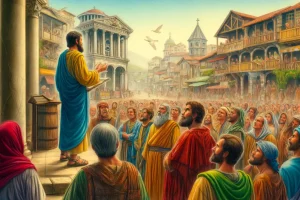
The Book of Isaiah
The Book of Isaiah is a pivotal text in both the Hebrew Bible and the Christian Old Testament, known for its profound prophecies and deep theological insights. Here are some quick key facts about the Book of Isaiah:
- Title and Position: Named after its primary author, Isaiah, who was a prophet. The book is one of the major prophetic writings in the Nevi’im, or Prophets section, of the Hebrew Bible and is found among the Major Prophets in the Christian Old Testament.
- Authorship and Date: Traditionally, the book is attributed to the prophet Isaiah son of Amoz, who is said to have lived and prophesied during the reigns of Uzziah, Jotham, Ahaz, and Hezekiah, kings of Judah. This places his ministry around the 8th century BC. Modern scholarship often divides the book into three parts, suggesting multiple authors over several centuries:
- Proto-Isaiah (Chapters 1-39): Generally attributed to Isaiah himself, focusing on the Syro-Ephraimite War, the Assyrian threat, and calls for repentance.
- Deutero-Isaiah (Chapters 40-55): Believed to be written toward the end of the Babylonian exile, offering words of comfort and the promise of return and redemption.
- Trito-Isaiah (Chapters 56-66): Possibly written after the exile, addressing the challenges of restoration in Jerusalem.
- Structure and Content: The book can be segmented based on the historical and thematic shifts:
- Judgment and Promise (Chapters 1-39): Contains oracles of judgment against Judah, Jerusalem, and neighboring nations, interspersed with messages of hope and the coming of a righteous king.
- Comfort and Redemption (Chapters 40-55): Characterized by the comforting messages from God, including the famous “Servant Songs” which prophesy the coming of an individual who will suffer for the sins of others.
- Restoration and Renewal (Chapters 56-66): Discussions on the true fasting that God desires and visions of a new heaven and new earth.
- Main Themes:
- Salvation and Judgment: Isaiah extensively discusses God’s judgment against sin and the salvation that He offers to the faithful.
- The Servant of the Lord: The concept of the “Servant” who will suffer for the people’s iniquities is a central theme, especially in Deutero-Isaiah.
- The Sovereignty of God: Throughout the book, the sovereignty of God over all nations and history is emphasized.
- Theological Significance:
- Isaiah’s prophecies are significant in both Jewish and Christian traditions; for Christians, many passages are seen as prophetic foretellings of Jesus Christ.
- The book offers profound insights into God’s plans for His people, stressing themes of repentance, redemption, and restoration.
- Modern Relevance: Isaiah’s messages about social justice, righteousness, and the universal reign of peace resonate powerfully today, providing hope and a call to ethical living.
The Book of Isaiah is a cornerstone of biblical prophecy, offering a complex blend of judgment, consolation, and hope. It is one of the most influential texts in the Hebrew Bible and the Christian Old Testament, deeply revered across centuries for its theological depth and prophetic vision. This comprehensive analysis explores the structure, themes, and theological implications of the Book of Isaiah.
Structure and Content
Isaiah is traditionally divided into three parts, each reflecting different historical contexts and theological themes:
- Proto-Isaiah (Chapters 1-39):
- Predominantly attributed to Isaiah son of Amoz, who prophesied in Judah from the late 8th to early 7th centuries BC during the reigns of kings Uzziah, Jotham, Ahaz, and Hezekiah.
- The content includes oracles against Judah and Jerusalem, prophetic warnings about reliance on foreign alliances, and the famous Immanuel prophecy which foretells the birth of a child as a sign from God.
- Historical narratives interspersed within these chapters recount the Assyrian threat and Hezekiah’s interactions with the prophet.
- Deutero-Isaiah (Chapters 40-55):
- Likely composed during the end of the Babylonian exile around the mid-6th century BC, this section offers a message of comfort and hope to the exiles.
- It introduces the figure of the Servant of the Lord, whose sufferings and subsequent exaltation are described in four poignant “Servant Songs.”
- Themes of universal salvation and the eventual triumph of Yahweh’s kingdom are predominant.
- Trito-Isaiah (Chapters 56-66):
- Possibly written after the return from exile, these chapters address the post-exilic community’s struggles.
- The text calls for righteous living and true observance of religious duties, contrasting true and false worship.
- Visions of a new creation and the restoration of Jerusalem as a beacon to all nations conclude the prophetic work.
Major Themes
1. The Holiness of God:
- Isaiah portrays God as the Holy One of Israel, emphasizing His transcendence, righteousness, and role as the ultimate judge and redeemer.
2. Judgment and Redemption:
- A dual theme throughout the book is God’s judgment on nations (including Israel) for their sins and His promise of redemption for those who turn back to Him.
3. The Servant of the Lord:
- Deutero-Isaiah’s Servant Songs (notably Isaiah 53) are central to Christian interpretations of Isaiah, viewed as prophetic anticipations of Jesus Christ. In Jewish tradition, these passages are seen as symbolic of the collective fate and mission of Israel.
4. The Future Hope:
- Isaiah frequently points to a future where God will establish everlasting peace and justice, not just for Israel but for all nations, highlighted by the promise of a new heaven and a new earth.
Theological Significance
Isaiah’s prophetic messages extend beyond immediate historical concerns, offering a theological vision that encompasses the entirety of creation. His prophecies have been foundational in both Jewish and Christian eschatological beliefs, shaping doctrines about the Messiah, the end times, and the ethical demands of faith.
Conclusion
The Book of Isaiah is a rich tapestry of oracles, historical reflections, and visionary promises. Its messages challenge believers to reflect on the nature of divine justice and mercy, the responsibilities of faith, and the universal scope of God’s salvific plans. The enduring relevance of Isaiah lies in its ability to speak to both the ancient and modern conditions, providing hope and a call to action for all who engage with its profound texts.
Tag:Assyrian invasion, Babylonian exile, Deutero-Isaiah, divine sovereignty, end times, eschatology, ethical living, Hebrew Bible, Hezekiah, holiness of God, Immanuel, Isaiah, Israel, Jerusalem, Judah, judgment, King Ahaz, major prophets, Messiah, new creation, New Jerusalem, Old Testament, prophecy, Proto-Isaiah, Redemption, salvation, Second Temple, Servant Songs, suffering servant, theology, Trito-Isaiah, universal peace, visions, Zion



